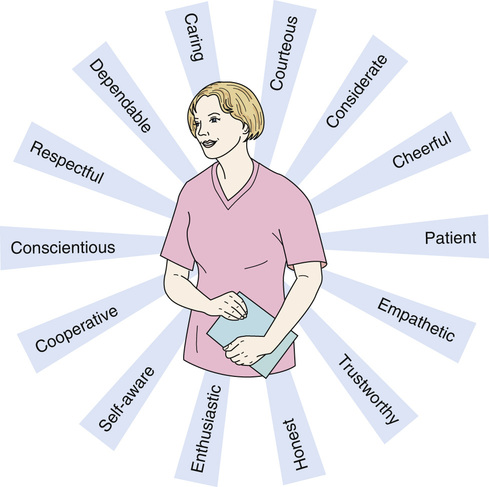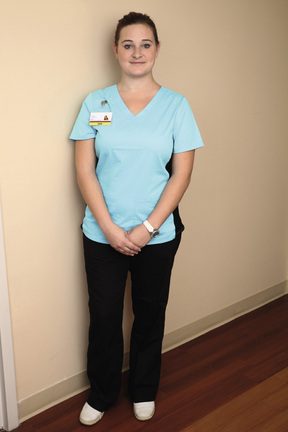Student and Work Ethics
Objectives
• Define the key terms and key abbreviation in this chapter.
• Describe the qualities and traits of a successful nursing assistant.
• Describe good health and hygiene practices.
• Explain how to look professional.
• Explain how to plan for childcare and transportation.
• Describe ethical behavior on the job.
• Explain how to manage stress.
• Explain how to problem solve and deal with conflict.
• Explain the aspects of harassment.
• Explain how to resign from a job.
• Identify the common reasons for losing a job.
• Explain the reasons for drug testing.
• Describe unethical student behavior and possible consequences.
• Explain how to promote PRIDE in the person, the family, and yourself.
Key Terms
As a student and a nursing assistant, you must act and function in a professional manner. Professionalism involves following laws, being ethical, having good work ethics, and having the skills to do your work. Laws and ethics are discussed in Chapter 5. Laws are rules of conduct made by government bodies. Ethics deals with right and wrong conduct. It involves choices and judgments about what to do or what not to do. An ethical person does the right thing.
In the workplace, certain behaviors (conduct), choices, and judgments are expected. Work ethics deals with behavior in the workplace. Your conduct reflects your choices and judgments. Work ethics involves:
In this chapter, “work ethics” also applies to you as a student. To be a successful student, practice good work ethics in the classroom and clinical setting and in your relationships with instructors and fellow students.
Health, Hygiene, and Appearance
Patients, residents, families, and visitors expect you to look, act, and be healthy. For example, a person must stop smoking. Yet you are seen smoking. And you and your clothes smell of smoke. If you are not clean, people wonder if you give good care. Your health, hygiene, and appearance need careful attention.
Your Health
Your health is important as a student and nursing assistant. In order to learn and to give safe and effective care, you must be physically and mentally healthy. Otherwise you cannot function at your best.
• Diet. You need a balanced diet (Chapter 27). Eat a good breakfast. To maintain your weight, balance your calorie intake with your energy needs. To lose weight, have fewer calories than your energy needs. Avoid foods high in fat, oil, and sugar. Also avoid salty foods and “crash” diets.
• Body mechanics. You will bend, carry heavy objects, and move and turn persons. These tasks place stress and strain on your body. Use your muscles correctly (Chapter 17).
Your Hygiene
Your hygiene needs careful attention. Bathe daily. Use a deodorant or antiperspirant to prevent body odors. Brush your teeth often—upon awakening, before meals, after meals, at bedtime. Use mouthwash to prevent breath odors. Shampoo often. Style hair in a simple, attractive way. Keep fingernails clean, short, and smoothly and neatly shaped.
Menstrual hygiene is important. Change tampons or sanitary pads often, especially for heavy flow. Wash your genital area with soap and water at least twice a day. Also practice good hand-washing.
Foot care prevents odors and infection. Wash your feet daily. Dry thoroughly between the toes. Cut toenails straight across after bathing or soaking them.
Your Appearance
How you look affects the way people think about you and the agency. When staff or students are clean and neat, people think the agency is clean and neat. They think the agency is unclean if the staff or students are messy and unkempt. People also wonder about the quality of care given.
Home and social attire is not proper at work or as a student in the clinical setting. You cannot wear jeans, halter tops, tank tops, short skirts, or low-cut tops or pants. Clothing must not be tight, revealing, or sexual. Women cannot show cleavage, the tops of breasts, or upper thighs. Men must avoid tight pants and exposing their chests. Only the top shirt button is open. Follow the practices in Box 6-2. They help you look clean, neat, and professional (Fig. 6-2, p. 58).
Preparing for School or Work
Being dependable is important as a student and in the workplace. As a student, you are preparing yourself for work. The classroom and clinical settings give you the chance to develop dependable behaviors. To show you are dependable:
To be dependable in the work setting, you must:
Absences and tardiness can affect your success in school. Your state’s nursing assistant training and competency evaluation program (NATCEP) requires a certain number of hours. To pass the course, you must complete the required number of hours.
Absences and tardiness are also common reasons for losing a job. Childcare and transportation issues often interfere with getting to school and work. You need to plan carefully.
Childcare
Someone needs to care for your children when you leave for school or work, while you are at school or work, and before you get home. Also plan for emergencies.
Transportation
Plan for getting to and from school or work. If you drive, keep your car in good working order. Keep enough gas in the car. Or leave early to get gas.
Carpooling is an option. Carpoolers depend on each other. If the driver is late leaving, everyone is late for school or work. If 1 person is not ready when the driver arrives, everyone is late for school or work. Carpool with staff you trust to be ready on time. When you drive, leave and pick up others on time. As a passenger, be ready to be picked up on time. Be on time as a driver and as a passenger.
Know bus or train schedules. Know what bus or train to take if delays occur. Always carry enough money for fares to and from school or work.
Have a back-up plan for getting to school or work. Your car may not start, the carpool driver may not go to school or work, or public transportation may not run.
Teamwork
Teamwork means that staff members work together as a group. Each person does his or her part to give safe and effective care. Teamwork involves:
You are an important member of the health and nursing teams. Quality of care is affected by how you work with others and how you feel about your job. Some days it might seem that you are doing more work than others. Other days, your co-workers may feel that you are doing less than they are. Try not to compare your assignments and what you are doing to other staff. Each staff member has a role to play individually and as a team member.
Attendance
Your NATCEP or employer has an attendance policy. Be on time for class and clinical experiences.
Report to work when scheduled and on time. The entire unit is affected when just 1 person is late. Call the agency if you will be late or cannot go to work. Follow the attendance policy in your employee handbook. Poor attendance can cause you to lose your job.
Be ready to work when your shift starts.
You must stay the entire shift. Prepare for childcare emergencies. Watching the clock for when your shift ends gives a bad image. You may need to work over-time. Prepare to stay longer if necessary. When it is time to leave, report off duty to the nurse.
See Focus on Communication: Attendance.
See Teamwork and Time Management: Attendance.
See Focus on Long-Term Care and Home Care: Attendance.
Your Attitude
You need a good attitude (see Box 6-1). Show that you enjoy your work. Listen to others. Be willing to learn. Stay busy and use your time well.
Your work is very important. Nurses, patients, residents, and families rely on you for good care. They expect you to be pleasant and respectful. You must believe that you and your work have value.
Always think before you speak. These statements signal a bad attitude.
• “That’s not my resident (patient).”
• “It’s not my turn. I did it yesterday.”
• “You didn’t say that you needed it right away.”
• “I did more than she (he) did.”
• “I work harder than anyone else.”
• “No one appreciates what I do.”
Stay updated, free articles. Join our Telegram channel

Full access? Get Clinical Tree




